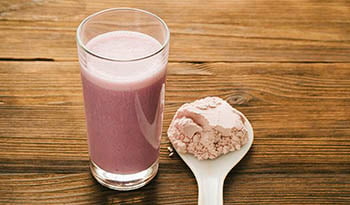Argumentene for kollagen som en del av en restitusjonsformel

Kollagen består av aminosyrer som er viklet sammen for å danne seigt og slitesterkt bindevev (hud, brusk, sener og knokler), og utgjør omtrent en tredjedel av det totale proteininnholdet i dyr. Kollagen er kjent for å være nyttig for hud-, tarm- og leddhelse, og for å forbedre treningsytelsen.
De fleste former for kollagentilskudd involverer påføring av enzymer, varme eller vann for å hjelpe til med å bryte ned kollagenstrukturen for å danne kollagenpeptider eller kollagenhydrolysater. , varme eller vann for å bryte ned kollagen& rsquo; s struktur for å danne kollagenpeptider eller kollagenhydrolysater. Kollagentilskudd tas vanligvis i én av to ulike former, enten som udenaturert kollagen eller denaturert kollagen. Det finnes flere ulike typer kollagen i menneskekroppen, og de mest utbredte er type I, II og III. Type I-kollagen er det mest utbredte og regnes som det sterkeste. Kollagen type II er et populært tilskudd, som er et peptid og den største bestanddelen av leddbrusk. Type III utgjør organene og huden vår og bidrar til å gi huden dens elastisitet.
Hvorfor er kollagen gunstig?
Mange mennesker får ikke i seg kollagen naturlig i kosten på grunn av moderne kjøttforedling og etterspørselen etter kjøtt uten bein og skinn. Før i tiden spiste man mange deler av et dyr, inkludert beinmarg og bindevev. Dette er en av grunnene til at benbuljong og andre kollagenholdige kosttilskudd blir stadig mer populære. I tillegg til reduksjon av kollagenholdige matvarer i kostholdet, er det faktorer som kan øke degenerasjonen eller nedbrytningen av kollagen, inkludert alder, utholdenhetstrening og kroppsvekt.
Mye av forskningen på kollagen og restitusjon etter trening fokuserer på kollagenets effekt på muskelvev. En studie på eldre personer med aldersrelatert muskeltap viste at kollagenpeptidtilskudd i kombinasjon med utholdenhetstrening gir en større forbedring i kroppssammensetningen sammenlignet med placebo, sammenlignet med en kontrollgruppe.En annen studie med tilskudd av hydrolysert kollagen hos eldre kvinner som spiste et relativt lavt til moderat proteinholdig kosthold, viste at nitrogenbalansen (protein) ble opprettholdt og at den magre kroppsmassen ble bevart.
Tilskudd av kollagen har også vist seg å ha en positiv effekt på bruskvevet og kan være gunstig for å redusere smerter hos personer med funksjonelle knesmerter.En systematisk gjennomgang fra 2016 konkluderte med at det forelå en betydelig mengde eksperimentelle in vitro- og in vivo-bevis for at kollagenpeptider har en benhelende effekt.
En annen studie viste at gelatin (med vitamin C ) inntatt før trening kan forbedre kollagensyntesen og kan spille en rolle i forebygging og reparasjon av skader. Vitamin C er viktig for kollagendannelsen i kroppen.Det er viktig å merke seg at denne studien kombinerte både in vitro- og in vivo-teknikker, og at kun én forsøksperson ble brukt som kilde til cellene i in vitro-delen av studien.
Kan kollagen erstatte andre typer proteintilskudd?
Det er viktig å huske på at kollagen ikke er et komplett protein, noe som betyr at det ikke inneholder nok av alle de ni essensielle aminosyrene. . Kollagen mangler den essensielle aminosyren tryptofan. Kollagen inneholder en stor mengde av aminosyrene glycin, prolin, hydroksyprolin og hydroksylysin. hydroksyprolin og hydroksylysin. Glysin er en viktig strukturell komponent i kollagen, og det har evnen til å redusere den inflammatoriske responsen. Dette er en annen mulig fordel med kollagentilskudd.
Bør du erstatte din nåværende restitusjonsformel med kollagen?
En restitusjonsdrikk etter trening bør bestå av tre komponenter:
- Protein for å bidra til muskelreparasjon og muskelrestitusjon.
- Karbohydrater for å gjenopprette muskelglykogen og forbedre restitusjonsprosessen.
- Elektrolytter for å fylle på det som gikk tapt under trening.
Bruk av kollagen i restitusjonsformelen kan ha en positiv effekt på muskel- og strukturvev, inkludert bein, sener og leddbånd. Mange blandinger av restitusjonsdrikker mangler noen av disse viktige komponentene for restitusjon, så bruk av kollagen kan være et godt alternativ eller tillegg.
Hvis din nåværende restitusjonsformel ikke inneholder noe protein, vil det sannsynligvis være en fordel å tilsette kollagenprotein i blandingen. Hvis du ønsker å erstatte din nåværende restitusjonsformel med kollagen, bør du vurdere å blande myse eller et annet protein som inneholder en tilstrekkelig mengde av alle de ni essensielle aminosyrene og kollagen for å få et mer komplett protein. og kollagen for å få et mer komplett protein. Det finnes også ferdige formler som inneholder en kombinasjon av myse og kollagen. I de fleste tilfeller kan ikke kollagen erstatte en tradisjonell restitusjonsdrikk, men det kan forbedre den.
Referanser:
- https://www.ncbi.nlm.nih.gov/pubmed/26353786
- https://www.ncbi.nlm.nih.gov/pubmed/19465192
- https://www.ncbi.nlm.nih.gov/pubmed/28177710
- https://www.ncbi.nlm.nih.gov/pmc/articles/PMC4940902
- https://www.ncbi.nlm.nih.gov/pmc/articles/PMC5183725
- https://www.ncbi.nlm.nih.gov/pmc/articles/PMC5183735
ANSVARSFRASKRIVELSE:Velværesenteret har ikke til hensikt å gi diagnoser ...
























































































